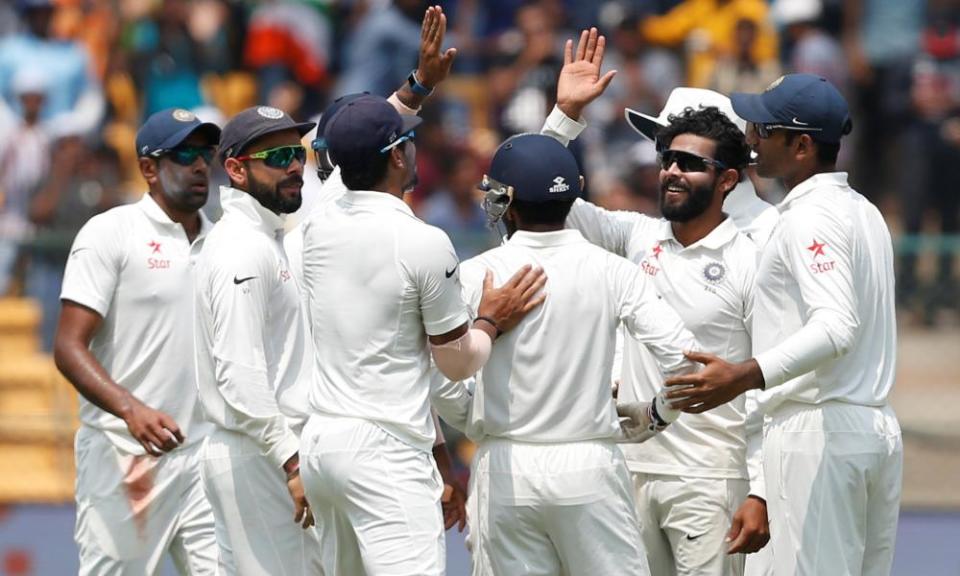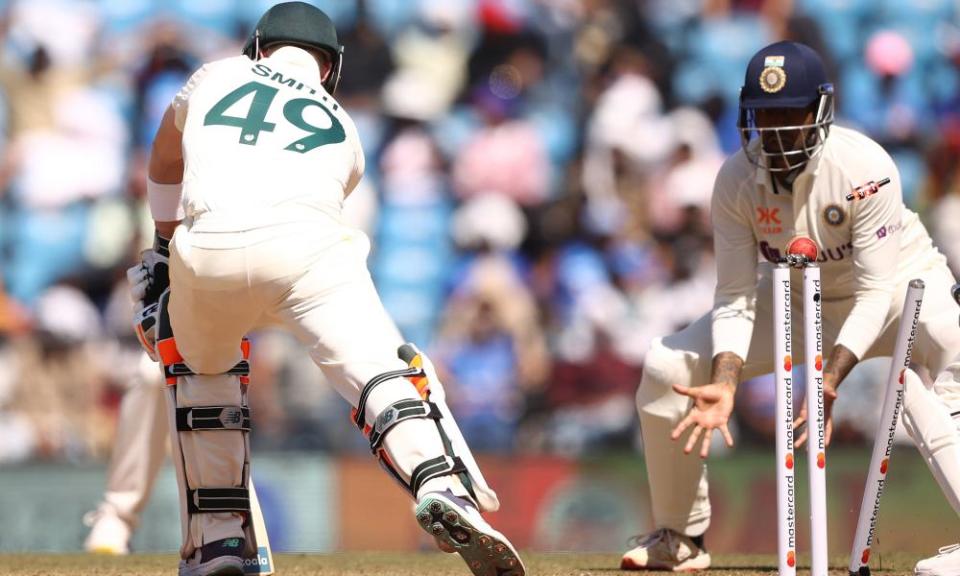Jadeja’s mastery gives Australia scant chance to test pitch theories

After the prelude came the test. Nagpur’s strange chessboard of a pitch, watered and prepared in different sections that may or may not have been related to the relevant strengths and vulnerabilities of the Australian and Indian teams, eventually had to reveal how it was going to play. On the first day of the Border-Gavaskar Test series, the possibility that the dry patches were going to specifically ruin Australia’s left-handed batters didn’t come to pass.
Of course, this may have been because they didn’t give it the opportunity. After weeks of thinking about spin, Usman Khawaja and David Warner both disappeared in the first few overs of pace. Pondering the strengths of India’s slow bowlers and being relieved at the absence of the pace leader Jasprit Bumrah could make someone devote less thought to quality quicks such as Mohammed Shami and Mohammed Siraj.
Related: Australia in a spin after being dismissed for 177 on day one of first Test in India
Siraj took the pitch out of the equation, hurling his first ball of the series full and curling it at the heels of Usman Khawaja. It pitched inside the line of leg stump by the thickness of a cigarette paper, and if not for hitting pad it would have crashed into leg stump with considerably more heft. Khawaja was given not out on the field but did not survive India’s review.
Shami used the area back of a length, angling a ball in at Warner from around the wicket and carving it away off the seam to beat the bat, into a searing deflection from Warner’s back thigh and rocketing his off-stump into backward-spinning oblivion. Within the first 13 balls of the match, Australia were 2 for 2, a score that means the same thing no matter what country you read it in.
Later the left-handers Matthew Renshaw and Todd Murphy lasted six deliveries between them, and the only part of the pitch that Ravindra Jadeja had to use was the strip in front of middle stump. Both times he bowled straight and struck them entirely adjacent.
With no Mitchell Starc, no Ashton Agar and no Travis Head, the last of the left-handed brigade was Alex Carey. For him the pitch bore no alarms at all. His first ball he reverse-swept Ravichandran Ashwin for four, coming back to the shot repeatedly and to effect. The India captain, Rohit Sharma, tried to encourage it by posting three fielders on the offside to lure a mistake to leg, but Carey happily took up the invitation. In the end the reverse brought him down for 36, unluckily under-edging into the ground and behind his legs into the stumps, but his collaboration of 53 runs with Peter Handscomb was the second-best of the innings.

The key partnership involved Steve Smith and Marnus Labuschagne, and the only left-hander involved was Jadeja when removing both. Most times that Australia teams have eluded trouble since 2019, either Smith or Labuschagne or both in combination have played a major part. They looked set to do the same again, batting through from the early loss of the openers to beyond the lunch break, sweeping and counterattacking to add 82 between defensive periods.
Jadeja’s quality, having missed Test cricket with injury since the middle of 2022, was supreme. The left-arm spinner used his trademark accuracy and variations in flight. The first-day surface gave him enough purchase, which in turn let him bowl straight more often than not. One delivery that ragged past Labuschagne’s edge was enough to subsequently draw Australia’s No 3 down the track in defence, the ball flighted enough to beat his bat again and provide a stumping.
Six overs later the ball went the other way, fast and skidding and coming in towards the stumps, producing the rare outcome of bowling Smith between bat and pad. There was the tiniest gap to aim for as Smith played for a small amount of spin, but Jadeja found it unerringly. That was the death knell for the innings, slipping from 109 for four to 177 all out. India wiped off 77 of those for the loss of one wicket by stumps. There is a long way to go in the match, but the only hand that mattered after the first day was the one that the home side holds: the upper one.

 Yahoo Sport
Yahoo Sport 


































































